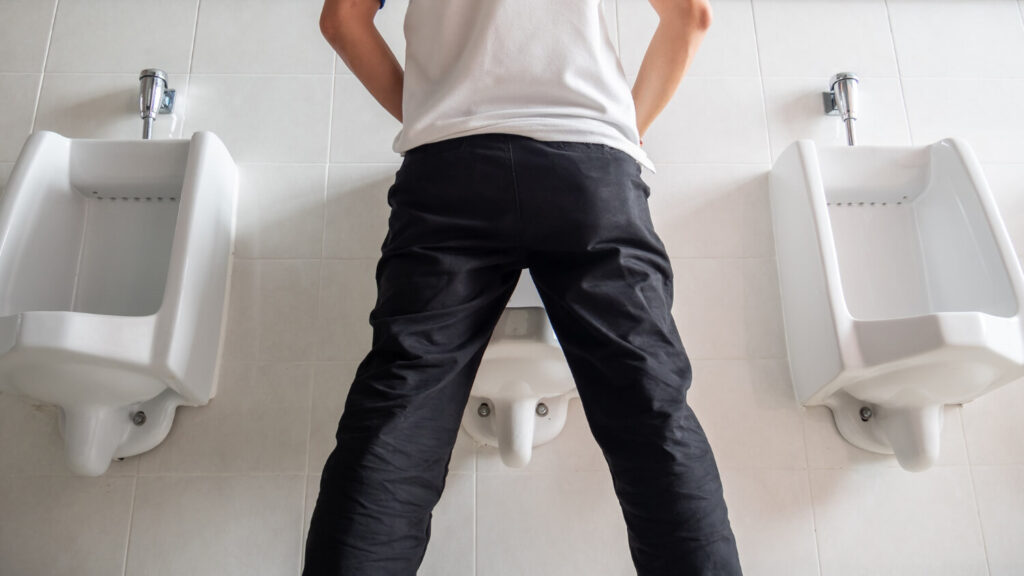Urinary tract infection is commonly associated with women, but they can also affect men. Understanding the causes of UTI in men is essential for effective prevention and treatment. In this article, we will explore the correlation of the factors and the patient’s gender, which can result in an infection in the urinary tract. Let’s begin!
Occurence of UTI in Men

A UTI occurs when bacteria enter the urinary system through the urethra and multiply in the urinary tract. This leads to inflammation and infection. In men, the most common type of UTI is an infection of the bladder, known as cystitis. However, UTI can also spread to the kidneys, causing a more serious condition called pyelonephritis.
Common Symptoms of UTI
UTI can cause a range of symptoms in men. Some of the most common symptoms include a frequent urge to urinate, a burning sensation during urination, cloudy or bloody urine, strong-smelling urine, lower abdominal pain, and a feeling of incomplete bladder emptying. If you experience any of these symptoms, it is important to seek medical attention for proper diagnosis and treatment.
Aside from the common symptoms mentioned above, there are other signs that may indicate a UTI. These include fever, chills, fatigue, and pain or pressure in the lower back or side. It is important to note that symptoms can vary depending on the severity and location of the infection within the urinary tract.
The Male Urinary System

The male urinary system plays a crucial role in maintaining the body’s overall health. Understanding the anatomy and function of this system can help shed light on the causes of UTI in men. Remember that male reproductive system and the urinary system share a common passage known as the urethra. Thus, can make men more susceptible to urinary tract infections.
Male urinary system consists of several key components, including the following:
- kidneys: filter waste from the blood, and the bladder, which stores urine until it is eliminated from the body
- ureters: responsible for transporting urine from the kidneys to the bladder
- urethra: carries urine from the bladder out of the body
Once the kidneys have filtered the waste products, urine travels through the ureters, which are long, narrow tubes that connect the kidneys to the bladder. The ureters use peristalsis, a wave-like muscle contraction, to propel urine towards the bladder. This process ensures a one-way flow of urine and prevents backflow into the kidneys.
In males, the urethra has an additional function as it also serves as a passage for semen during ejaculation. The male urethra is longer than the female urethra, measuring approximately 8 inches (20 centimeters) in length. However, its length and shared function with the reproductive system can make men more susceptible to urinary tract infections.
The Role of the Urinary System in Body Function
Beyond simply eliminating waste, the urinary system plays a vital role in maintaining proper body function. It helps regulate blood pressure by controlling the volume of blood and the concentration of electrolytes in the body. The kidneys filter waste products, excess water, and toxins from the blood, ensuring that the body maintains a healthy balance of electrolytes, such as sodium, potassium, and calcium.
Another crucial function of the urinary system is the production of erythropoietin, a hormone that stimulates the production of red blood cells in the bone marrow. Red blood cells are responsible for transporting oxygen throughout the body, and any disruption in their production can lead to anemia and other health complications.
Meanwhile, the urinary system also plays a role in maintaining the body’s acid-base balance. The kidneys regulate the levels of acids and bases in the blood, helping to maintain a stable pH level. This is important for the proper functioning of enzymes and other biochemical reactions in the body.
Furthermore, the urinary system helps eliminate excess water and waste products, such as urea and uric acid, from the body. These waste products are byproducts of metabolism and need to be removed to prevent their accumulation, which can lead to various health issues.
Any disruption or infection in the urinary system can have a significant impact on overall health and well-being. Prompt medical attention and proper treatment are essential to prevent complications and ensure a healthy urinary system. Setting an appointment online for immediate check up is an important step to do to ensure treatment as needed.
Main Causes of UTIs in Men

Now that we have a better understanding of the urinary system and the basics of UTI, let’s explore the causes of UTI in men.
This urinary infection is a common health issue that can affect both men and women. However, the causes of UTI in men can differ slightly from those in women. Understanding the specific causes of UTI in men is crucial for prevention and effective treatment.
Bacterial Infections
One of the most common causes of UTI in men is a bacterial infection. Bacteria can enter the urinary system through the urethra or can travel from other areas of the body through the bloodstream. Once inside the urinary system, bacteria can multiply and cause an infection. Certain types of bacteria, such as Escherichia coli (E. coli), are commonly responsible for UTIs.
Poor hygiene practices can increase the risk of bacterial infections in the urinary system. Failing to clean the genital area properly, especially after bowel movements, can allow bacteria to spread and enter the urethra.
Sexual Activity
On the other hand, sexual activity can introduce bacteria into the urinary system, making it important to maintain good hygiene before and after intercourse. During sexual activity, bacteria from the genital area can enter the urethra and cause an infection in the urinary system. This risk is further increased when engaging in unprotected intercourse.
Certain sexual practices, such as anal intercourse, can introduce additional bacteria into the urinary system. This can further increase the risk of UTIs in men. Proper hygiene and safe sexual practices are crucial in preventing UTIs related to sexual activity.
Urinary Tract Abnormalities
Some men may have urinary tract abnormalities, such as an enlarged prostate or a urethral stricture, which can make them more prone to UTIs. These abnormalities can create obstacles or blockages in the urinary system, interfering with the natural flow of urine and increasing the risk of infection.
An enlarged prostate, a common condition in older men, can compress the urethra and hinder the complete emptying of the bladder. This can lead to stagnant urine, providing an environment for bacteria to grow and cause an infection. Similarly, a urethral stricture, a narrowing of the urethra, can impede the flow of urine and increase the risk of UTIs.
Immune System Issues
Individuals with weakened immune systems, such as those with diabetes or HIV/AIDS, are at a higher risk of developing UTIs. A compromised immune system can make it more difficult for the body to fight off infections, allowing bacteria to thrive in the urinary system.
In individuals with diabetes, high blood sugar levels can weaken the immune system, making them more susceptible to infections, including UTIs. Similarly, HIV/AIDS weakens the immune system, making it harder for the body to defend against bacterial infections.
It is essential for individuals with weakened immune systems to take extra precautions to prevent UTI, such as maintaining good hygiene, staying hydrated, and seeking prompt medical attention if any symptoms arise.
Risk Factors for UTIs in Men
Understanding the risk factors associated with UTIs in men is crucial for prevention and early intervention.
Age-Related Risks
Age can be a significant risk factor that causes UTI in men. As men get older, the risk of developing urinary tract infections increases. This is often attributed to changes in the prostate gland, a decrease in immune function, or the presence of other age-related health conditions.
Lifestyle Factors
Certain lifestyle factors can also impact the likelihood of developing UTI. Poor hygiene practices, such as infrequent handwashing or not properly cleaning the genital area, can increase the risk of bacterial infections. Additionally, holding in urine for extended periods, not drinking enough fluids, and consuming excessive amounts of caffeine or alcohol can also contribute to UTI.
Medical Conditions That Increase Risk
Having certain medical conditions can make men more susceptible to urinary tract infections. Conditions such as diabetes, kidney stones, urinary incontinence, and prostate enlargement can all increase the risk of developing UTI. It is important to manage these conditions properly to reduce the likelihood of infection.
Diagnosis and Treatment for UTI
When it comes to diagnosing a UTI, healthcare professionals such as urologists may perform various tests. These tests can include a urine analysis to check for the presence of bacteria, blood tests to assess kidney function, and imaging tests such as ultrasounds or CT scans to evaluate the urinary system for any abnormalities.
Treating a UTI typically involves a course of antibiotics to eliminate the infection. The specific antibiotic prescribed will depend on the type of bacteria causing the infection and its susceptibility to certain medications. It is important to complete the full course of antibiotics as prescribed by the healthcare provider to ensure that the infection is completely eradicated.
Conclusion
UTIs in men are more common than commonly believed, and understanding the causes and risk factors associated with these infections is crucial. By maintaining good hygiene practices, practicing safe sexual activity, and managing underlying medical conditions, men can significantly reduce their risk of developing UTIs.
If you suspect that you might have a UTI, seeking prompt medical attention from a urologist is a must. Doing so can help you receive early treatment to prevent more serious complications. Take proactive steps to protect your urinary health and overall well-being by booking an online consultation now!
UTI in Men: Test Your Knowledge
Learn about causes, symptoms, and prevention
Concerned about UTI symptoms?
Consult with a urologist online for proper diagnosis and treatment.
Book a Consultation


